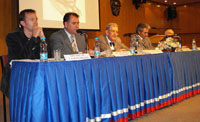 On October 9, the Bilkent University Center for Turkish Literature organized a symposium entitled "A Surrealist Mevlevi: Asaf Hâlet Çelebi." It started with opening speeches by prominent writer Doğan Hızlan, and Hilmi Yavuz, literary critic and faculty member in the Department of Turkish Literature.
On October 9, the Bilkent University Center for Turkish Literature organized a symposium entitled "A Surrealist Mevlevi: Asaf Hâlet Çelebi." It started with opening speeches by prominent writer Doğan Hızlan, and Hilmi Yavuz, literary critic and faculty member in the Department of Turkish Literature.
During the panel, Prof. Dr. Ramazan Korkmaz shared his ideas on the symbolism of Çelebi's poems, claiming that there is a kind of "poly-dimensionality" to them. In his talk, Assoc. Prof. Ramazan Gülendam discussed Çelebi's interesting life, and offered the theory that Çelebi's poetics could not be understood during the period in which he wrote.
After Gülendam, Mustafa Şerif Onaran discussed Çelebi's "exciting poetics." According to Onaran, Çelebi was a unique poet in his time, as illustrated through a number of characteristics, including the names of his books, and the themes he created. Onaran also mentioned Çelebi's efforts as a frequent independent candidate for membership in the Grand National Assembly in the late 1940's and 50's.
The last speaker, Asst. Prof. Laurent Mignon, took the view that Çelebi's poems include expressions following Mevlevi and Buddhist traditions. He felt that Çelebi's poems, written mostly during the Second World War, showed a view that was quite different from other poets of the period, such as Orhan Veli Kanık.
During the symposium, students from the Turkish Literature Department read four of Çelebi's poems: Müge Yılmaztürk read "Nurûsiyah" and "He;" M. Said Aydın read "Mariyya;" and Naim Atabağsoy read "İbrâhîm."
The symposium brought together an interesting group of intellectuals to analyze this avant-garde poet on the fiftieth anniversary of his death.
Naim Atabağsoy (EDEB/Graduate Student)







